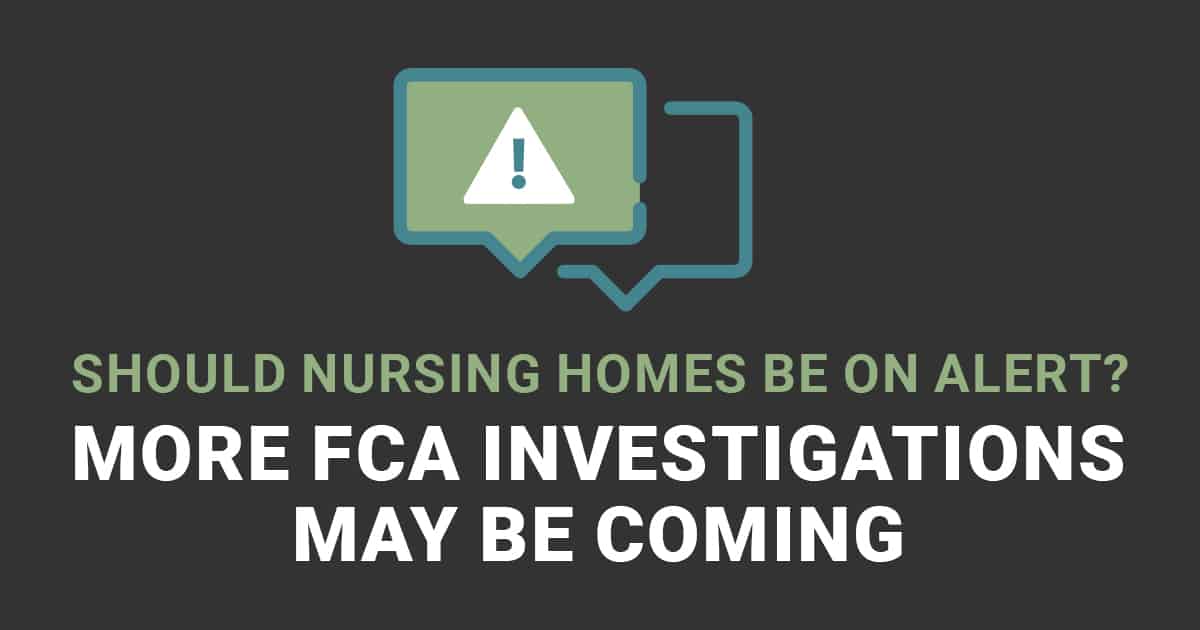Four Questions and Answers About the False Claims Act and Nursing Homes

The Justice Department has put nursing homes across the nation on notice: It has a False Claims Act, and it’s not afraid to use it.
The federal government’s law enforcement arm has filed suit against the American Health Foundation, the connected AHF Management Corporation and three nursing homes. One is in Philadelphia, and two are in Ohio.
“Nursing homes are expected to provide their residents, which include some of our most vulnerable individuals, with quality care and to treat them with dignity and respect,” said Principal Deputy Assistant Attorney General Brian M. Boynton, head of the Justice Department’s Civil Division, in a news release. “The department will not tolerate nursing homes — or their owners or managing entities — who abdicate these responsibilities and seek taxpayer funds to which they are not entitled.”
Curious about what’s going on? Here are four quick questions about the legal action and what it means for you.
What’s being alleged here, anyway?
According to reporting from the Philadelphia Inquirer, the DOJ is following up on an earlier fine against the Philadelphia nursing home with the suit adding the Ohio locations. They’re playing “for even bigger stakes with a False Claims Act lawsuit, filed June 14 in Philadelphia,” writes reporter Harold Brubacker.
“The suit alleges that staff neglected patients for years and allowed them to live in a pest-infested building while AHF, which collected millions in management fees from Cheltenham, applied relentless pressure to cut nursing costs.
We should note here that AHF denies the allegations and says that it is proud of the care provided.
That wasn’t what the Inquirer reporter heard from everyone, though. “This is a really bad place,” said Toby Edelman, senior policy attorney in the Washington office of the nonprofit Center for Medicare Advocacy. “I couldn’t read it (the 144-page civil complaint). I started getting so agitated.”
What’s the government doing and why?
According to a June 22 post from JD Supra, this Justice Department has taken a new direction over the last couple of years. It’s “increasingly utilizing substandard quality of care as the basis for False Claims Act cases as part of the National Nursing Home Initiative launched by the DOJ in March 2020. Last year alone, the federal government collected over $5.6 billion in recoveries under the False Claims Act.”
The concept at work here is simple. The government contends that a provider submitting claims for substandard care has violated the act. When you make a claim, you’re certifying that care follows a whole passel of laws and regulations—saying one thing when you want to be reimbursed but providing something else to patients? You just might be making a false claim.
Besides the humiliation of being sued by the government, fending off one of these claims could also be costly in the short and long terms.
According to the post, “providers can be liable for three times the amount of reimbursement plus a civil penalty ranging from $12,537 to $25,076 per claim as well as face potential criminal penalties and exclusion from participation in government health care programs.”
What else do I need to know?
Brenna Jenny and Francesca Ozinal writing for Original Source: The Sidley Austin False Claims Act Blog, False Claims Act case focuses on three areas.
- General care deficiencies: They note that the complaint says the facilities in question were “an outlier on several CMS quality measures, which are metrics that CMS has designated as potentially useful in evaluating nursing home performance.” The department says that because nursing homes know their scores, they could have figured out they were outliers and taken action to fix the problem.
- Staffing: The authors acknowledge that federal regulators don’t require particular staffing levels. On the other hand, “the White House earlier this year called on CMS to develop and implement such standards.” The complaint looked at circumstantial evidence to suggest there were such problems, including email messages and low CMS ratings.
- Prescription drugs: Administration of unnecessary and excessive prescriptions to residents were criticized, with the DOJ highlighting reports from outside experts that the drugs were administered “at two to three times the state average.” This follows the White House guidance: “CMS will launch a new effort to identify problematic diagnoses and refocus efforts to continue to bring down the inappropriate use of antipsychotic medications.”
How can Med Law help me?
With a rapidly changing legal landscape and pressure from the federal government, nursing homes should be aware of their risk while caring for residents. This is where Med Law Advisory Partners can help.
Med Law can be a vital partner in helping defend worthless care claims if your facility faces a False Claims Act investigation. For years, the Med Law team has worked with their clients to challenge FCA allegations and develop demonstrative evidence supporting “the good care” being provided in long-term care facilities. Med Law can also analyze cases during litigation to determine areas of vulnerability and provide guidance to strengthen the reliability of your systems and improve resident outcomes. Get in touch with the Med Law team today to see how they can help you face the future with confidence.